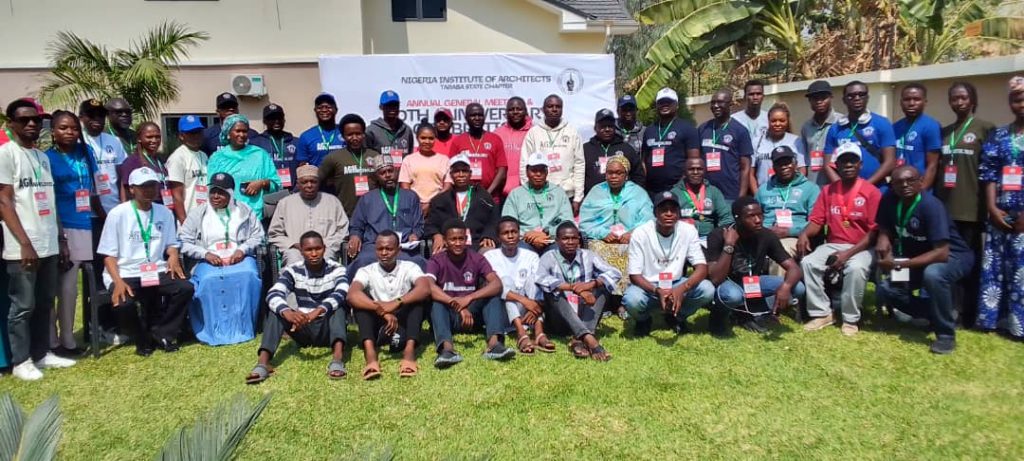The Nigeria Institute of Architects (NIA), Taraba State Chapter, convened its 2025 Annual General Meeting, marking its 10th anniversary, against a backdrop of escalating concerns about the pervasive involvement of unqualified practitioners in the building industry. The gathering, themed “Architects as Leaders of the Built Environment,” served as a platform to address the critical issue of building collapses, largely attributed to the unchecked activities of these unqualified individuals, often referred to as “quacks.” The event, held at the Blue Nile Suites in Jalingo, brought together key stakeholders, including government representatives, seasoned architects, and emerging professionals, to deliberate on strategies to enhance the profession’s integrity and safeguard public safety. The overarching message resonated throughout the meeting: the urgent need for stricter regulatory enforcement, enhanced collaboration between government bodies and industry professionals, and a renewed commitment to ethical practices within the architectural field.
Hadiza Bello-Yero, Permanent Secretary of the Taraba State Ministry of Works and Infrastructure, voiced her deep concern over the prevalence of quacks within the building profession. She highlighted their detrimental impact on construction standards, directly linking their involvement to the recurring incidents of building collapses plaguing Taraba State and Nigeria as a whole. Bello-Yero emphasized the critical role of NIA members in the design and supervisory phases of construction projects, lamenting that their expertise is often bypassed, leading to substandard structures. Furthermore, she pointed to the rapid advancements in technology, particularly Artificial Intelligence, as a contributing factor to this issue. The accessibility of design software, coupled with a lack of regulatory oversight, allows individuals with insufficient training and qualifications to create building plans, often neglecting crucial safety protocols and standards.
Ibrahim Kawuwa, the outgoing State Chairman of NIA, echoed Bello-Yero’s concerns, stressing the importance of collaborative efforts between government authorities and industry professionals to effectively address the issue of building collapses. He reflected on the chapter’s decade-long journey since its inception in 2015, highlighting the significant strides made in promoting architectural excellence within the state. Kawuwa called for renewed dedication and commitment from members to uphold the highest standards of design, construction, and ethical practice, urging them to take a leading role in shaping the built environment for the betterment of Taraba State. His remarks underscored the vital role of the NIA in advocating for professionalism, ensuring quality control, and fostering a culture of safety within the construction sector.
Ali Mukhtar-Adnan, the 3rd Vice President of NIA, delivered a keynote address, emphasizing the broader leadership role architects play beyond technical expertise. Represented by Aliyu Babaji, Mukhtar-Adnan urged architects to embrace their position as leaders in the built environment, advocating for best practices, actively engaging with stakeholders, and driving innovative solutions to global challenges such as rapid urbanization, climate change, and social equity. He emphasized the importance of ethical leadership, transparency, and integrity within the profession, highlighting these qualities as essential for fostering trust and credibility. Mukhtar-Adnan encouraged the chapter members to elect leaders who embody these values, promoting a collaborative spirit that would drive the growth and development of the profession both within the state and nationally.
Bulus Bello-Umar, the guest speaker at the event, focused on the significance of innovation and sustainability in architectural practice. He stressed the need for architects to create habitable spaces that are not only aesthetically pleasing but also environmentally responsible. Bello-Umar encouraged professionals to leverage technological advancements to meet the evolving needs of clients while adhering to stringent environmental standards. He underscored the importance of balancing functionality, aesthetics, and sustainability in design, emphasizing the architect’s role in mitigating the environmental impact of construction and promoting sustainable development practices. His lecture served as a call to action for architects to embrace innovative design solutions that address the challenges of a rapidly changing world.
The event culminated in the election of new leadership for the Taraba State Chapter of NIA. Adashu Agbu was elected as the new Chairman, entrusted with leading the chapter into its next phase of growth and development. Ignatius Agbese assumed the role of Vice Chairman, while Bulus Bello-Umar was elected as Secretary. The election of these new leaders marked a transition in leadership, bringing in a fresh perspective and renewed energy to address the challenges facing the profession. The new leadership team assumes responsibility for upholding the NIA’s core values, advocating for its members, and promoting architectural excellence within Taraba State. Their tenure will be crucial in navigating the complex landscape of the building industry, enforcing ethical practices, and fostering a culture of safety and sustainability.


